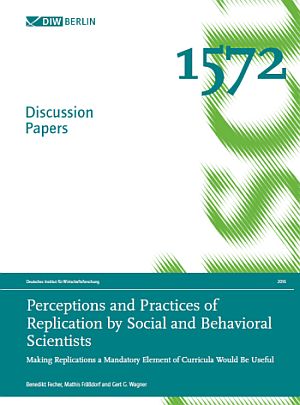Posted: April 21st, 2016 | Author: Sven | Filed under: Data Sharing, Report | Tags: Replication, replication studies, research paper | Comments Off on New Working Paper: “Perceptions and Practices of Replication by Social and Behavioral Scientists”
 One of our project partners has just released a publication that deals with the replication crises in economics and the social sciences.
One of our project partners has just released a publication that deals with the replication crises in economics and the social sciences.
In the abstract the three autors state:
We live in a time of increasing publication rates and specialization of scientific disciplines. More and more, the research community is facing the challenge of assuring the quality of research and maintaining trust in the scientific enterprise. Replication studies are necessary to detect erroneous research. Thus, the replicability of research is considered a hallmark of good scientific practice and it has lately become a key concern for research communities and science policy makers alike.
In their discussion paper Fecher, Fräßdorf and Wagner analyze perceptions and practices regarding replication studies in the social and behavioral sciences. Their analyses are based on a survey of almost 300 researchers.
Read the rest of this entry »
Posted: April 5th, 2016 | Author: Sven | Filed under: Data Sharing, EDaWaX, Opinion | Tags: replication studies | Comments Off on Note on “research parasites” published in SCIENCE
 Benedikt Fecher and Gert G. Wagner, both also affiliated with the EDaWaX-project, have just published a note in a recent issue of sience under the title “A research symbiont”.
Benedikt Fecher and Gert G. Wagner, both also affiliated with the EDaWaX-project, have just published a note in a recent issue of sience under the title “A research symbiont”.
The background for their note is the editorial of D. Longo and J. Drazen – two editors of the New England Journal of Medicine – published in January 2016. In the editorial, Longo and Drazen critically assessed the concept of data sharing in medicine. Their main concern is that a “new class of research person will emerge” that uses data, which were gathered by other researchers, for their own original research questions. The authors, although indirectly, later referred to this class of researcher as “research parasites”.
Fecher and Wagner argue contrarily: For them, the two editors of the New England Journal of Medicine miss the core of the scientific paradigm when writing that researchers may “even use the [open] data to try to disprove what the original investigators had posited.” Instead, Fecher and Wagner argue that data users are research symbionts and benefit the research ecosystem: Using research data to try to disprove a result is good scientific practice, especially in light of the replication crisis (not only) in the social sciences.
A longer version of the Fecher’s and Wagner’s note is available open access (working paper).
Picture: “share-computer-key-260″ by Emilio Quintana on flickr.com. License: CC BY-NC-SA 2.0
 One of our project partners has just released a publication that deals with the replication crises in economics and the social sciences.
One of our project partners has just released a publication that deals with the replication crises in economics and the social sciences.







